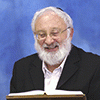Our Task Is To Cling To The Upper One
 A question I received: Who is our “Upper One” in spirituality?
A question I received: Who is our “Upper One” in spirituality?
My Answer: We don’t know that. We exist in the womb of the Upper One as a mere point, a droplet of semen, our spiritual Reshimo (record, gene). Beyond this Reshimo, we have nothing else!
In fact, our corporeal body, mind, and feelings have no relation to the spiritual world and cannot be seen there. In the spiritual world, there is only a womb of the Upper One (Malchut of Infinity) and us inside it. And each of us is a Reshimo (0/1, Shoresh Aviut/Aleph Hitlabshut) or in other words, a point in the heart.
Our task, as a point in the heart, is to try to cling to the wall of the spiritual womb! Beginning with the three days during which the semen is absorbed, the first problem for the embryo (us) is to attach itself to the wall of the womb. Attaching to the womb is establishing the very first contact with the Upper One.
In order to do this, we must annul ourselves before the Upper One. But where is this Upper One, this wall of the womb? What is it exactly? The Upper One is the Kabbalistic group, my environment! This is how the Upper One reveals the Creator for me.
Thus, there are the group and me, who adheres to it, despite all the obstacles. I accept the entire force of the group’s desire for bestowal, and I am willing and ready to take it all in through annulling myself before them.
When I attach myself to the group, my Aviut, which is the strength of my will to bestow, begins to grow and cause unpleasant sensations in me: disappointment, growth of egoism, and burdening of the heart. But I must go even deeper in, like a leech, clinging to the group which is the “wall of the womb.”
Then, between us, the first connection will appear, not through a point, but through the tube through which “blood” will start flowing into me. This connection, so far, is on the inanimate level (“Dam”- blood, from “Domem” – inanimate), but I will have already received spiritual sustenance from the Upper One.
All of this takes place through my connection with the group. There is no other “wall” through which I can enter the spiritual world!
From the 3rd part of the Daily Kabbalah Lesson 6/24/10, Article “Preface to the Sulam Commentary”
Related Material:
Kabbalah Moments: “Spiritual Simulator”
Kabbalah Moments: “Annul Oneself Before The Group”
5 Minutes Of Light: “Growing The Desire For Spirituality”












